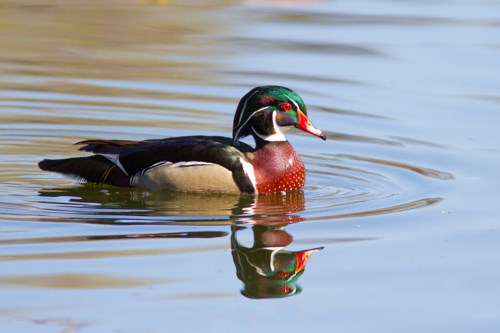
NPS/Gordon Dietzman IntroductionThe wood duck gathers most of its food of insects, snails, mollusks, plants, seeds, nuts, and berries, from the forested wetland habitat it prefers. Unlike many ducks, the female nests in tree holes and will perch in trees. These small, beautiful ducks nearly disappeared in the early 1900s due to habitat destruction, primarily the loss of hollow trees that provided nest sites. They have made a remarkable comeback, mostly due to an extensive nest box program. Nest boxes are often placed near water features, such as wooded ponds, but these ducks will travel some distance from water to find a suitable cavity. Shortly after hatching the ducklings will leap from the boxes and natural cavities to the ground, a distance that may range from a few feet to as much as 50 feet! Most hit the ground and are unhurt in their semi-controlled fall. The female quickly leads the vulnerable young to a nearby pond. Get InvolvedHelp wood ducks by building and installing wood duck nest boxes using these wood duck box instructions. A very good book is "Woodworking for Wildlife" and containing plans nesting structures for many species of birds, including wood ducks. Identification
| |
Last updated: February 25, 2022
